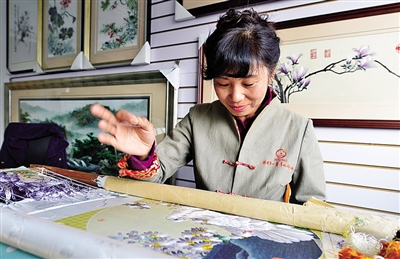Ou embroidery: treasure of traditional handicrafts
With a history dating back more than 800 years, Ou embroidery is one of the most famous styles of traditional Chinese embroidery. Its name derives from the Ou River which runs through Wenzhou in Zhejiang province, where it was originally produced.
During the late Qing Dynasty (1889 – 1912) and the early Republic of China, many embroidered works were sold to foreign countries such as America and Canada due to their high value.
Since the founding of People’s Republic of China in 1949, fine works of Ou embroidery are often given to foreign heads of state as national gifts emblematic of the Middle Kingdom.
As with any craft, Ou embroidery masters have arisen, capable of creating artistic styles and designs, akin to oil and watercolor paintings, and giving their works tremendous ornamental value.
In the 1980s, embroidery works featuring portraits became popular, as well as hair embroidery which involves creating fine patterns in silk using hair as thread, and ushering in a new gamut of innovation and creativity to the craft.
In recent years, the government of Wenzhou in Zhejiang province has sought to protect and preserve the practice of Ou embroidery, helping inheritors pass down their unique set of skills to the next generation.
In 2008, the techniques of Ou embroidery were listed as a national intangible heritage.

[Photo from en.gotohz.com]

 Print
Print Mail
Mail
 20 Cultural Symbols
20 Cultural Symbols Why Zhejiang
Why Zhejiang Experiencing high-tech products at WIC
Experiencing high-tech products at WIC Zhejiang Release
Zhejiang Release Zhejiang News
Zhejiang News